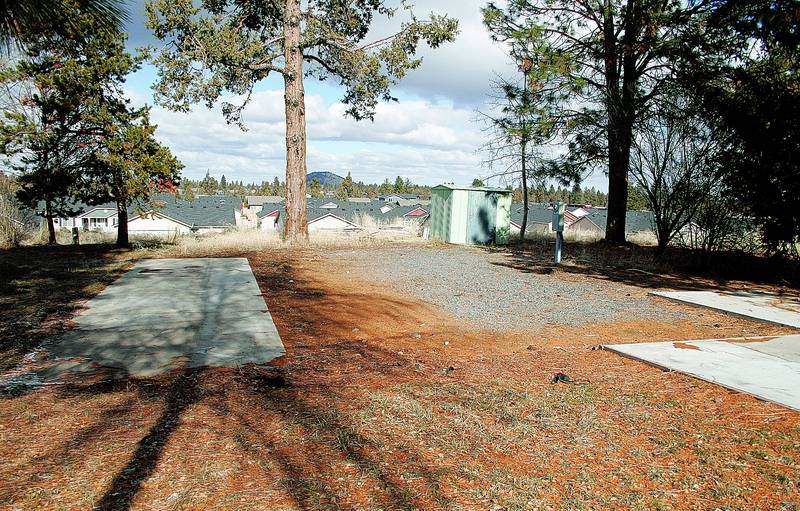Forced out
Published 4:00 am Sunday, February 19, 2006

- Empty mobile home pads at Juniper Hills mobile home park are pictured with a subdivision in the background.
Brian Lucy’s mobile home is old and worn, flanked by a sagging wooden porch that’s filling with trash.
But he owns it, and he’s about to lose it.
Lucy, along with all the other remaining residents of the Juniper Hills Mobile Home Park at Murphy and Brosterhous roads, has until May 1 to move out.
The 30-acre park has been sold out from under them. Soon, the bulldozers will move in to make way for 161 brand-new $300,000 to $700,000 homes.
Lucy, whose income last year amounted to around $6,000, has no idea what to do. He says he can’t afford to pay $4,000 to $5,000 to move his 26-year-old home, even if he could find a place to move it to, which is unlikely. He can’t afford to pay the $3,000 it would cost to have it hauled to the dump.
So he’s stuck. In 2 1/2 months, he’ll go from homeowner to homeless, one of the more obvious victims of a run-up in Bend real estate prices that is spurring developers to gobble up existing affordable housing developments, as well as the last few empty parcels of buildable land that exist within city limits.
”It may not seem like much to a lot of people,” Lucy, 45, said Tuesday, between angry outbursts about the the city, the park owners, the park management – all of whom he views as contributors to his plight. ”But this is the first home that I’ve ever owned in my life. And it doesn’t seem right.”
The loss of affordable housing, particularly in mobile home parks, is a growing problem throughout the state.
More than 65,000 people live in 1,500 mobile home parks throughout Oregon, according to figures from Rep. Jerry Krummel, R-Wilsonville, who pushed a pair of homeowner-relief bills through the Legislature last year to try to help people in his own district who were displaced. Between 2001 and 2005, nearly 50 parks closed statewide, displacing more than 1,300 residents.
Bend alone has lost more than 700 of the 2,159 mobile home dwellings it had in 2000, according to Damian Syrnyk, a senior planner who’s trying to assemble a comprehensive tally of the city’s housing stock.
The existence of mobile home parks – where homeowners typically lease space from the park’s owners, who own the land and provide the basic services – has been squeezed between two forces: the internal dynamics of the industry, which have sagged, and the value of the underlying land, which has soared.
Juniper Hills is a case in point.
Paul Brewer, the Laguna Niguel, Calif., businessman who owns Juniper Hills along with three other Oregon parks, including Cascade Terrace in Bend, traces Juniper Hills’ problems back to a financial crisis that hit the industry a few years ago as Conseco Finance Corp., the nation’s largest mobile home lender, went bankrupt.
Lending on mobile homes, which had been free-wheeling for years, suddenly dried up, reducing the supply of new tenants, Brewer said. Older parks like Juniper Hills, with its 108 lots, struggled.
”We kept pouring money into dealer incentives, trying to keep the place full, but it seemed for every home I brought in, 1 1/2 were going out,” Brewer said.
The flow of dividends to Brewer and his partners dried up in 2000, never to return, while the management struggled to keep the place afloat, Brewer said.
Meanwhile, the price of raw subdividable land in Bend soared, reaching $100,000 per acre in 2003 and flying to $400,000 by late 2005, Bratton Appraisal Group owner Dana Bratton told a Bend Chamber of Commerce audience last week.
The reason is simple, Central Oregon Builders Association Executive Vice President Tim Knopp told the same crowd. At current rates of demand, he estimated that the city has enough buildable land within its boundaries to last a couple of years.
Without an expansion of the boundaries, the price of land that’s already within the city will only increase, leading to higher home prices on homes built on raw land, and more pressure on owners of underutilized land to sell.
At Juniper, ”it ended up being where the land was worth more than the park itself, because of the vacancies,” Brewer said. ”It was either do it, or lose the property in foreclosure.”
Vacancy rates hit 20 percent before Brewer split the park, formerly known as The Pines Mobile Home Park, in two. The lower 30 acres continue to be known as The Pines, which exists under new ownership.
The rest, Juniper Hills, was sold to developer Darrin Kelleher’s company, Lava Crest LLC, to subdivide.
The tenants got their one-year eviction notices last May.
Brewer said he left around $60,000 in escrow with the new owners of The Pines to help tenants who were able to relocate to move their homes from Juniper Hills to vacant spaces in The Pines. But, for the most part, only the owners of the park’s larger and newer homes were able to use that deal.
Others were unable to take advantage of it, either due to personal financial problems or to city rules that restrict the relocation of older single-wide mobile homes.
Brewer paid around $2.675 million for The Pines back in 1990, according to county records.
He and Kelleher declined to say how much Kelleher agreed to pay for the 30-acre Juniper Hills parcel. But after Lava Crest is finished developing it, readying its lots for sale to homebuilders, the site could be worth between $11.27 million and $22.54 million, given Bratton’s estimate of the current sales range of $70,000 to $140,000 for developed entry-level Bend lots.
The development plans, currently under review with the city, call for new streets, all new water and sewer hookups, curbs and a general cleanup.
Some of the new homes, with views of the Cascades and Pilot Butte, could command up to $700,000 at today’s prices, Kelleher said. Other prices would probably bottom out around $300,000, if built today.
Kelleher said he doesn’t lack sympathy for the plight of the trailer park’s residents, but with land as tight as it is, he had to pick up acreage wherever he could get it.
”The issue is low-income housing,” Kelleher said. ”What are we going to do to replace this stuff? Is it in another city, in Bend, or what? The bottom line is, Bend is losing its affordable housing.”
There don’t seem to be any quick solutions on the horizon.
The city of Bend didn’t hire an affordable housing coordinator until it got federal funding for one when it reached 50,000 in population in 2003. Its affordable housing committee has floated two proposals.
One would require that percentages of newly annexed lands be devoted to affordable housing.
Another would slap $1,000- to $2,000-per-unit fees on most new subdivisions to raise money to encourage more affordable developments.
But a group of Realtors, developers, affordable-housing agencies and city officials are still trying to agree on the right approach before anything goes to the city council.
As far as displaced mobile home residents are concerned, there’s not much help available from any quarter.
The city of Wilsonville passed an ordinance last year that would force park owners to compensate displaced tenants when a park closes, but a lawsuit bottled it up in court.
The state Legislature passed a bill last year that grants $10,000 in tax credits to homeowners who are forced to move their homes, but that’s only useful if the home can actually be moved, said Pat Schwoch, a Newberg mobile home owner who leads the Manufactured Home Owners of Oregon, a tenants’ rights group.
Schwoch is meeting regularly with a committee of park owners’ lobbyists, legal aid groups, tenants’ rights groups and park owners, including Brewer, to try to give the Legislature a more global solution to the problems caused by disappearing parks. But no resolution is in sight yet.
”We all know we’ve got a mess on our hands,” she said. ”And my, what a mess. I know the park owners who own the land have their rights, but those of us who own our houses ought to have some rights, too.”
Some of the tenants in Juniper Hills are managing to relocate themselves without trauma.
Roger Bennett bought 2 1/2 acres in Christmas Valley for the trailer he shares with his wife, Vickie, after he retired from Mountain View Heating last year. He was busy getting the home ready for its move Wednesday, looking forward to the days when he can ”kick the feet back on the back porch and watch the sun set.”
He paid $11,000 for the land. The move, he figures, will cost around $10,000 by the time the house is moved and all the utilities are hooked up.
That’s money some of the other remaining residents don’t have.
Lucy, who says he is a former construction worker with a degree from the University of Oregon in music composition, is disabled with avascular necrosis, a disease that is eroding his hip and leg bones.
He made the last payment in August on the $12,500 trailer he owns with Patricia Shearer, a bakery worker. They’ve found nowhere to move it, and couldn’t afford to move it if they did, he said.
He and Shearer paid $320 a month in lot rent for eight years. Payments on the trailer were $170 a month.
He’s contacting legal-aid lawyers and housing agencies, looking for options, but he’s running out of time. The stress, he said, is eroding his and Shearer’s relationship and the frustration is consuming him.
Rents on two-bedroom units in older Bend apartment complexes averaged around $535 a month late last year, according to a Bratton Appraisal Services tracking survey. That’s about $40 higher than Lucy and Shearer’s highest payments on the trailer and lot.
The Central Oregon Regional Housing Authority is also leasing units in a subsidized apartment building in east Bend, with rents adjusted for low-income families.
After years of home ownership, though, and with the potential expenses of demolition, Lucy still feels stuck.
”Moving, on the best day, is one of the most stressful things that a family or a person can go through, let alone trying to figure out a way to throw out your house,” he said. ”I mean, how do you throw out your house?”
Down the hill, Colleen Murphy, 49, said she’s in the same position. She can’t afford to move her trailer, can’t afford to demolish it, and can’t imagine where she and her grown sons are going to move.
”This isn’t a new trailer,” she said Tuesday, recovering from ankle surgery in her crowded bedroom. ”It’s an old trailer. It’s kind of run-down, but it’s something that I worked for. I got myself off the streets to have this and I worked hard for it.
”I know it’s not much,” she said. ”But it’s mine.”






